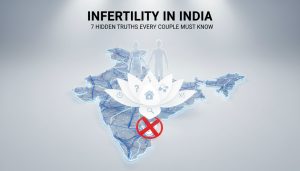If you have gone through an IUI cycle and now waiting for the happy news, you must be searching for what are the most visible pregnancy symptoms after IUI? The long wait after the IUI treatment is though very hard and is like a roller coaster ride of emotions but if the treatment comes to be successful, there is nothing more joyous than looking for the pregnancy symptoms after IUI. Not every woman will have the same symptoms but more or less they all are similar. Pregnancy symptoms after IUI appear within two weeks of the treatment if it is a successful attempt.
What is IUI?
To understand what are the most visible pregnancy symptoms after IUI, one must understand what IUI treatment is?
Intrauterine insemination, also known as artificial insemination, is a simple procedure that can be performed in the clinic under an infertility expert’s supervision or at home using the home IUI kit.
At the clinic, an infertility expert places the semen, previously collected and processed in the laboratory, in the uterine cavity. Before insertion, the expert “washes” the sperm by removing seminal fluid and concentrating the sperm.
This procedure, known as intrauterine insemination (IUI), can also be paired with assisted reproductive techniques like intracytoplasmic sperm injection (ICSI) during assisted reproductive technology (ART) to treat even the most severe cases of male-factor infertility.
ICSI, or intracytoplasmic sperm injection, is a treatment that involves injecting a single sperm directly into an egg to assist with fertilization. This technique is often used in conjunction with assisted reproductive technology (ART) to help couples struggling with male-factor infertility.
IUI can be performed using fertility medicines to increase ovulation function or performed during a woman’s natural ovulation. An anovulation pregnancy kit can be used to determine when a woman is ovulating.

The semen is placed higher in the uterine cavity so that it bypasses the cervix, which shortens the journey through the fallopian tubes. This increases the number of sperm that have a chance to meet the mature egg(s).
IUI is the best option for many infertility issues who have the following infertility conditions
Low sperm count or motility
IUI is a big help with these problems as sperm doesn’t need to travel far.
Infrequent ovulation
IUI increases the chance of successful fertilization, as IUI drugs can trigger ovulation.
Unexplained sterility
IUI eliminates several variables.
Structural or Sexual Problems
Structural or sexual problems that make fertilization difficult – for example, if a man cannot ejaculate, the doctor can surgically remove the semen and then insert it directly into the woman’s body.
Immune System Problems
Immune system problems cause the woman’s body to attack the man’s sperm and kill them.
Additionally, IUI can be a good option for people who don’t want to try IVF, can’t afford IVF, or have objections to the IVF process.
IUI cannot treat all infertility problems, especially implantation problems or recurrent miscarriages.
In rare cases, male fertility problems may not be treatable and other options, such as using sperm from a donor or adoption, may need to be considered. Therefore, it is important to get a comprehensive study from a fertility specialist. Clearing all the doubts with the expert will help you in choosing the best treatment for you.
A skilled fertility specialist can help you determine if the IUI is a good choice and can help you evaluate the prospects for success. In rare cases, immune system problems may also contribute to male fertility issues that cannot be treated, making it crucial to seek expert advice and guidance for successful treatment of the cause of infertility.
Understanding the potential role of immune system problems in male infertility is essential for finding the best treatment options.
What To Expect On The Day Of The IUI Procedure
Once the doctor determines when you ovulate, your appointment will be scheduled for the procedure to be as close to your ovulation as possible. You will come to the fertility clinic and the male partner will be instructed to provide his sperm sample or sperm will be collected from the sperm bank. At this point, the sperm will be “washed.”
When the sperm is “washed”, it is the lab technicians who separate the best sperm from the sample. They also remove seminal fluid that should not go to the uterus. All this is done to introduce the best viable sperm into the uterus to create the most favorable conditions for conception.
The female will then lie on the table in the examination room. The doctor will slide a thin tube or catheter through the cervix and into the uterus. The main symptom mentioned in this part of the procedure is a slight urgency. But most women say it’s not painful, it’s just awkward.
There is no need for anesthesia and the IUI procedure will be completed within 20 to 25 minutes. Once done, the patient is advised to rest for up to 20 minutes before getting up because a symptom that may occur in some patients is dizziness or mild cramping after completion.
If the initial tests and IUI procedure do not result in pregnancy, your doctor may recommend additional tests, such as more thorough testing of your female partner or additional tests for possible causes of male infertility, such as sperm quality, hormonal imbalances, or genetic factors, to help identify the cause of your infertility.
What To Do To Increase The Success Rate Of An IUI Cycle?
Timing is very important while going for an IUI cycle. The procedure occurs around the middle of your cycle when you are ovulating. If you are on a drug cycle, you will be using drugs to trigger ovulation. Else an infertility expert will help you in tracking the natural cycle.
Following an IUI procedure, it is important to act as if you are already pregnant. This ensures that, if the implantation is successful, the pregnancy starts as well as possible. Talk to your expert about all the medications you take, especially prescription medications that can affect pregnancy. Also, do the following:
- Avoid alcohol, illegal drugs, and cigarettes.
- Eat a healthy, balanced diet rich in protein.
- Drink a lot of water.
- Get enough sleep.
- Stay physically active, but don’t try to lose weight or start an exercise routine that is too intense.
- Find ways to deal with stress.
- Take a prenatal vitamin that contains folic acid or folate.
Following the above points helps to develop a plan to manage the two-week wait – the two weeks between the IUI treatment and your first pregnancy test. Additionally, go for a vacation, try a new hobby, have fun dates, and try interesting activities that can distract you. While it can be tempting to spend all of your time contemplating a potential pregnancy, it’s important to deal with your emotions no matter what the outcome.

When Do The Pregnancy Symptoms After IUI Appear?
Although the IUI procedure results in the insertion of sperm directly into the uterus, it will take about four to six days for the zygote to reach the uterus after the fertilization of the egg.
Implantation can take five days or longer. It will take a few more days for the HCG levels to rise, allowing pregnancy to be confirmed in the pregnancy test. Therefore, it is best to have a pregnancy test at least two weeks or 14 days after the procedure.
Waiting for pregnancy symptoms after IUI cycles can be both stressful and emotional.
However, you need to stay calm and not stress. Trust your infertility expert and support each other at this crucial stage, and try delaying home pregnancy tests for at least two weeks. And when the time is right, the best way to determine if you are pregnant is to have a blood test as it provides an accurate result.
The symptoms of implantation following an IUI procedure are similar to the symptoms of a normal pregnancy.
Following are the most visible pregnancy symptoms after IUI
Implantation Bleeding
Implantation bleeding is one of the very first pregnancy symptoms after IUI. Although not every woman experiences this, it is considered normal either way. Implantation bleeding occurs when the egg builds up on the lining of the uterus causing a small vaginal discharge, which can be easily confused for periods. Cramps can often accompany this. It usually occurs about six to twelve days after conception.
Menstrual Delay
The delay in periods is a big clue to the possibility of conception. While spotting or light bleeding can be noticed in between, it’s likely nothing to worry about. You can always consult a doctor if you notice any unusual bleeding that worries you.
Breast Tenderness
If your breasts are heavy, sensitive and a little painful, you may head towards pregnancy. Swelling and tenderness in the breasts are also common symptoms during menstrual periods. But if these symptoms remain even after delayed periods then it will be wise to take a pregnancy test.
Nausea
One of the very common pregnancy symptoms after IUI includes nausea or morning sickness. This can be triggered by an intense odor, an aversion to a particular food, or sometimes for no reason at all. This is due to an increase in estrogen hormone levels in your body.
Fatigue
Feeling tired during this time is normal. Since the hormone in your body that is in abundance is known to cause sleepiness, you may feel very tired during this time due to the high level of progesterone in your system. Also, your blood pressure and blood sugar levels drop, causing an increase in blood production in your body. This consumes a lot of energy and contributes to the feeling of tiredness.
Desires and Reluctance
While you may develop an intense, almost unnatural craving for certain foods, you may also be unable to tolerate certain smells as a part of pregnancy symptoms after IUI. This is a pregnancy symptom that may stay with you for a long time until the end of labor. Your food cravings can often cause you to forage at odd times! These cravings and aversions to smells and food are caused by hormonal changes in the body.
Consistently High Body Temperature
An increase in progesterone levels can raise your body temperature. If you have noticed an increase in your body temperature for more than 20 days, this is a good sign and you may be pregnant.
When To Take A Pregnancy Test After IUI?
Although the IUI procedure leads to the delivery of sperm directly into the uterus, after the egg is fertilized, it takes about 4 to 6 days for the zygote to reach the uterus. Transplantation may take another five or more days. The HCG level, which confirms pregnancy on a pregnancy test, will take a few more days to rise. Therefore, it is best to have a pregnancy test at least two weeks or 14 days after the procedure.
Waiting for pregnancy symptoms after IUI can be stressful and emotional. However, you must stay calm and avoid the stress of it. Talk to your partner and support each other during this critical period and get a home pregnancy test. And when the time is right, the best way to determine if you are pregnant is to have a blood test, as it guarantees accurate results.
Day by day pregnancy symptoms after IUI
3 days after IUI: Symptoms that can be expected
Some women experience spotting immediately after the IUI procedure. This is caused by irritation of the fine tissue of the cervix and vagina and is not implantable bleeding. Implantation bleeding occurs later, usually 7-11 days after the procedure, when the egg is implanted in the wall of the uterus.
In about three days, any initial staining will stop. If you are still bleeding, have cramps or pain, contact your doctor. Because it is impossible to get pregnant so early in the process, you will not have any symptoms of pregnancy. Consider keeping a list of all the symptoms you notice during the first few days.
This will give you an idea of what is normal for your body and help you decide what is and is not a pregnancy symptom after IUI. For example, if you experience breast tenderness, you will know that tenderness is a typical symptom for you and may not necessarily be a sign of pregnancy.
6 days after IUI: Implantation and more
In the six-day stamp, you may be approaching implantation. Implantation usually occurs approximately one week after the IUI procedure, so now is the time to start monitoring for signs of implantation.
If you notice any slight spotting, it may be implantation bleeding. Some women also experience convulsions after implantation. However, most women do not have implant bleeding and do not have symptoms so soon.
Therefore, the absence of pregnancy symptoms after IUI does not necessarily mean that you are not pregnant or that the procedure has failed. Also, in some women, implantation occurs much later – 11 or 12 days after IUI. You may need to wait a few more days for any noticeable signs of implantation or pregnancy.
14 days after IUI: pregnancy symptoms after IUI
Ovulation usually occurs between the 11th and 21st day of your cycle, depending on its length. During ovulation, one of the ovaries releases a mature egg that travels to the fallopian tube.
To become pregnant, sperm must travel to the fallopian tube and fertilize the egg. If this happens, an embryo is created and then implanted in the uterus, making the reproductive system crucial in the process of pregnancy.
The male reproductive system also plays a vital role in pregnancy, as it produces and transports sperm necessary for fertilization, with sperm movement being a key factor in fertility and sperm production being a crucial aspect of male fertility and sperm production.
While some people experience many pregnancy symptoms on the 14th day, others have very little or no symptoms. Also, on the 14th day, the symptoms of pregnancy can be very similar to those that occur during PMS, ovulation, and when taking fertility drugs. If you pay close attention to changes in your body every month, you can find out if your symptoms are related to pregnancy or something else.
14 days after IUI, human chorionic gonadotropin hormone levels may be high enough to cause pregnancy symptoms.
Cramps
Mild cramps in the abdomen or uterus may be a sign of early pregnancy. This is usually accompanied by light spotting or bleeding, known as implant bleeding. Implantation bleeding occurs after implantation of a fertilized egg into the uterine lining, approximately 10 to 14 days after IUI. Implantation bleeding and cramps usually occur at the time you are about to menstruate, usually a few days before. It usually lasts anywhere from a few hours to a few days and the flow is very easy.
Fatigue
Fatigue is also a common symptom of pregnancy on the 14th day. Hormonal changes in early pregnancy can make you feel tired all day long. Drowsiness and extreme exhaustion are some of the first pregnancy symptoms after IUI. During the first days of pregnancy, your progesterone levels rise, making you tired and asleep. Your body will also start producing more blood to support your growing fetus. It also leads to increased exhaustion and fatigue.
Tender Breasts
Swollen and tender breasts are also pregnancy symptoms after IUI on the 14th day. During early pregnancy, hormonal changes can make your breasts painful, sensitive, and heavy with darker nipples. Breast discomfort is likely to decrease after a few weeks as your pregnant body adapts to hormonal changes.
Appetite
Due to hormonal changes during pregnancy, you may have cravings for certain foods around the 14th day. During the first weeks of pregnancy, you may develop aversion or sensitivity to certain odors or smells and other tastes. These symptoms may or may not persist throughout the pregnancy.
The pregnancy symptoms after IUI treatment will be different for every woman. Depending on the type of IUI undergone, i.e., medicated or unmedicated will also decide the symptoms. Two weeks after the IUI treatment is the best time to go to the expert for a pregnancy test.
You can take a home pregnancy test also but the reliability is not too much. The expert will perform a blood test to check the HCG levels in your blood. Testing for HCG helps in evaluating if pregnancy is processing normally or not.
Falling or slowly rising HCG level means there are complications in the pregnancy. Subhag infertility clinic is equipped with all types of equipment to cater to all the needs of the patients. It is a trusted name in the field of infertility clinics.





